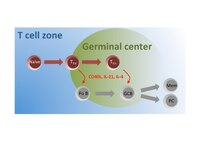
Photo from wikipedia
Chronic graft-versus-host disease (cGVHD) is a major cause of morbidity and mortality after allogeneic hematopoietic stem cell transplantation (allo-HSCT). Previous studies have shown that T follicular helper cells (Tfh) contribute… Click to show full abstract
Chronic graft-versus-host disease (cGVHD) is a major cause of morbidity and mortality after allogeneic hematopoietic stem cell transplantation (allo-HSCT). Previous studies have shown that T follicular helper cells (Tfh) contribute to immune pathology in cGVHD, but the function of extrafollicular helper T cells during cGVHD pathogenesis remains largely unknown. In the current study, we identified circulating extrafollicular helper T-like cells (CD44hiCD62LloPSGL-1loCD4+, c-extrafollicular Th-like) in human peripheral blood. We performed phenotypic and functional analyses of c-extrafollicular Th-like cells from 80 patients after allo-HSCT to explore the role of these cells in the development of human cGVHD. Patients with active cGVHD had significantly higher frequencies and counts of c-extrafollicular Th-like cells than those of patients without cGVHD. The expansion of c-extrafollicular Th-like cells was more significant in patients with moderate/severe cGVHD than that of patients with mild cGVHD. C-extrafollicular Th-like cells from patients with active cGVHD exhibited increased functional abilities to induce plasmablast differentiation and IgG1 secretion compared to those of patients without cGVHD. Moreover, c-extrafollicular Th-like cell levels were highly correlated with the generation of autoreactive B cells, plasmablasts and IgG1 antibodies. Our studies provide new insights into human cGVHD pathogenesis and identify c-extrafollicular Th-like cells as a key element in the development of human cGVHD.
Journal Title: Journal of autoimmunity
Year Published: 2019
Link to full text (if available)
Share on Social Media: Sign Up to like & get
recommendations!